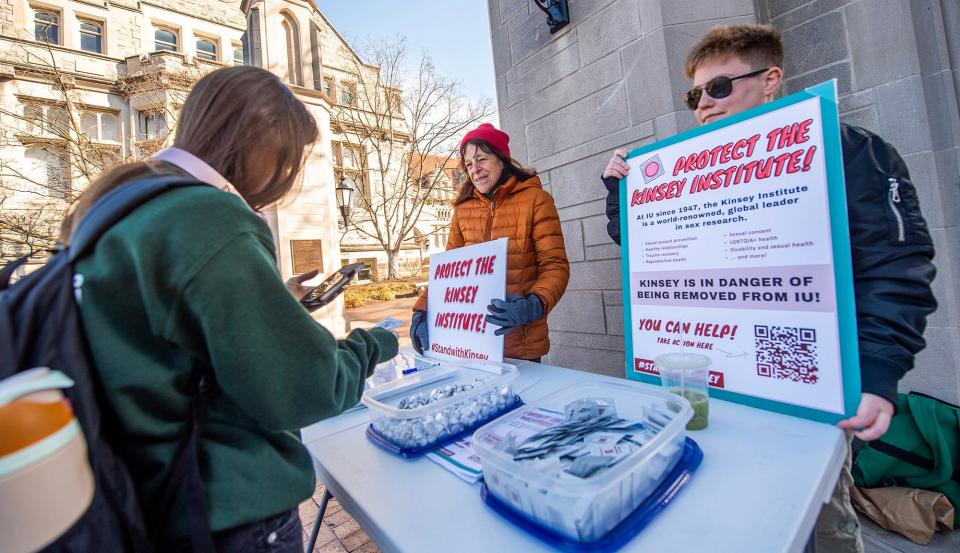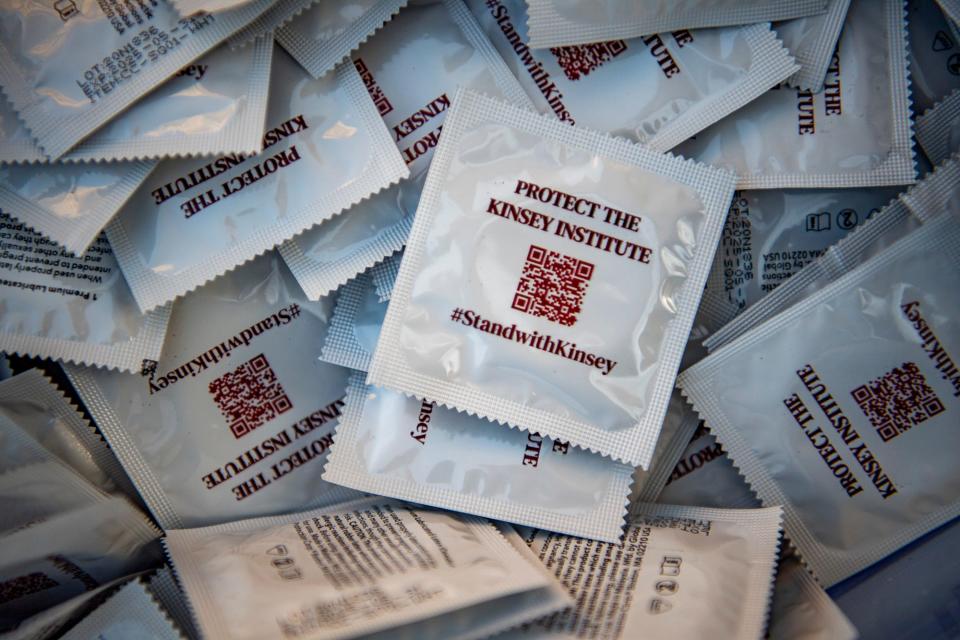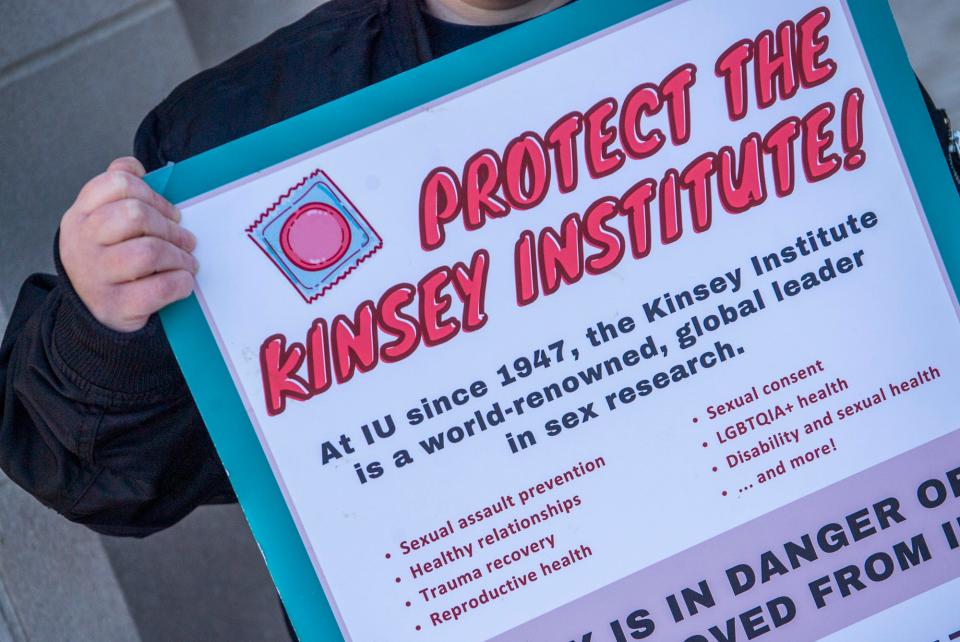Indiana University hasn't told Kinsey Institute researchers what trustees will vote on
- Oops!Something went wrong.Please try again later.
At this month’s Feb. 29 Board of Trustees meeting, board members will vote on a proposal from the Indiana University administration that will determine whether the Kinsey Institute remains under the operations of IU.
Researchers at the Kinsey Institute say they still haven’t seen the administration’s proposal.
“We have no idea what is being proposed to the Board of Trustees, and we don’t know what they’ll be voting on,” said Zoe Peterson, a senior scientist at the Kinsey Institute. “We would like more transparency.”

The Kinsey Institute, among the country’s foremost sex and gender research institutions, has been at Indiana University since its inception in 1947, pioneering the popular Kinsey scale of human sexuality and amassing one of the largest collections of materials related to sex, gender, and reproduction.
The institute has “been under attack since it started,” researchers say, for its controversial research on sexuality, and its founder Alfred Kinsey’s work, which involved psychological interviews with sex offenders. But last year, Indiana Republicans passed a bill that barred the institute from receiving state dollars through IU, taking aim at a 2016 change that transformed the institute from a nonprofit into being part of IU’s official operations.
IU and the institute both spoke out against the amendment as it passed, but researchers at the institute maintained the change amounted to “an accounting problem.” The majority of the institute’s funding comes directly from grants and donations, and any state dollars that went to the institute through IU could be easily written out of the university’s general fund, researchers have said.
Yet, since the amendment took effect, IU administration has been pushing forward a proposal to sever the institute from the university by once again establishing it as a 501(c)(3) nonprofit – a conversation that researchers at the Kinsey Institute say they've largely been left out of.
“If the proposal was to sever the institute, the Board of Trustees could vote on that without us having ever seen or commented on that proposal,” Peterson said. “We would like to know exactly what they’re proposing and what that means for us, and we would like to have input on that.”
Researchers at the institute say they’ve been attempting, for months, to directly meet with administration and get involved in conversations over the proposal. And with time dwindling ahead of the Feb. 29 meeting, they’re getting desperate.
An ‘accounting problem,’ and an ‘accounting solution’
Institute researchers believe the complications caused by the state law could be resolved internally by ensuring the IU general fund doesn’t support the operations of the Kinsey Institute, and they don’t understand why the administration is proceeding with a plan to sever the institute from the university.
Peterson says severing the institute from IU and establishing a nonprofit would already necessarily involve “accounting solutions."
“No matter where we are located, whether we are part of IU or a separate 501(c)(3), there will have to be accounting solutions to ensure that we’re not actually getting any state money,” Peterson said. “The new state law that prohibits funds to the Kinsey Institute created an accounting problem, and we hope that the university will try to address it with an accounting solution, rather than severing the institute from IU.”

Kinsey Institute researchers say they haven’t been able to provide input
Since the IU administration first notified the Kinsey Institute of plans to establish it as a nonprofit in October, institute researchers said they’ve had few opportunities to provide input to the administration.
The proposal was first set for a vote by the BOT in November, but the item was tabled after public pushback. Institute researchers say they still haven’t seen the plan from November, nor the proposal set for a vote on Feb. 29.
In January, the administration convened a series of three listening sessions for members of the IU community to provide input on the future of the institute. Cynthia Graham, another senior scientist at the institute, says the meetings were well attended by members of the institute and IU community, but not by members of the administration.
“The provost showed up for the first one and spoke for about two minutes, and then left the room,” Graham said. “So he was not there to hear the concerns, which is really important, I think.”
A university spokesperson referred the Herald-Times to a Feb. 15 column from Provost Rahul Shrivastav on protecting academic freedom in response to challenges from the state house, including the fate of the Kinsey Institute and Senate Bill 202. The column said feedback from the listening sessions has been heard and will be shared with the BOT.
"The President and I remain committed to protecting the Kinsey Institute and to ensuring that its name, research, scholarship, collections, and education initiatives continue as a pillar of intellectual freedom and academic inquiry at IU," Shrivastav wrote. "I want to emphasize that everyone involved in this process seeks to protect and promote the work of the Kinsey Institute – in perpetuity at IU."
Researchers fear future of the archives
Researchers say the proposal to sever the institute raises several key questions, including the fate of the physical building at Lindley Hall, the titles of senior scientists which are tied to IU, and the ability of graduate student researchers to continue collaborating with the institute.
“There are just a lot of concerns raised, and very little answers,” Graham said.
Chief among Kinsey Institute researchers’ concerns is the fate of the Kinsey Institute Collections.

The administration told the institute in October the archives – which comprise approximately 7,000 art and artifact items and a large volume of records and manuscripts – would be kept within IU’s collections.
“We’re very concerned about that because the art and artifacts are very much tied to the institute,” Peterson said. “They were donated by people to the institute, and they represent kind of an unparalleled source of historical information and art.”IU’s FAQ page on the Kinsey Institute proposal says, “All collections associated with the Kinsey Institute will remain at IU and will remain in service of the Kinsey Institute’s research and educational mission.” Graham says this vague wording doesn’t make clear if the archives will remain readily accessible, nor if researchers outside the university will have access.“We have no idea what that means,” Graham said.
Graham worries if the collections aren’t kept in the Kinsey Institute’s domain, their contents — which have always been controversial, she says — will be more vulnerable to being removed or erased.
Beyond the collections, researchers also worry a formal severance from IU would make the institute more vulnerable as a whole.
“Those in the state that passed this amendment to defund the institute, we don’t think that they will stop at this,” Graham said. “And the university would seem to be bowing down to them, really.”
Peterson says the institute’s collaborative history with IU is a crucial part of its operation, and hopes the administration will pursue options that allow that collaboration to continue.
“We really value our association with IU,” Peterson said. “We think that the Kinsey Institute and IU have a really strong history and strong relations, and we want to continue that. We think that IU makes us stronger, and we make IU stronger.”
Reach Brian Rosenzweig at brian@heraldt.com.
This article originally appeared on The Herald-Times: IU appears poised to make Kinsey Institute into nonprofit

